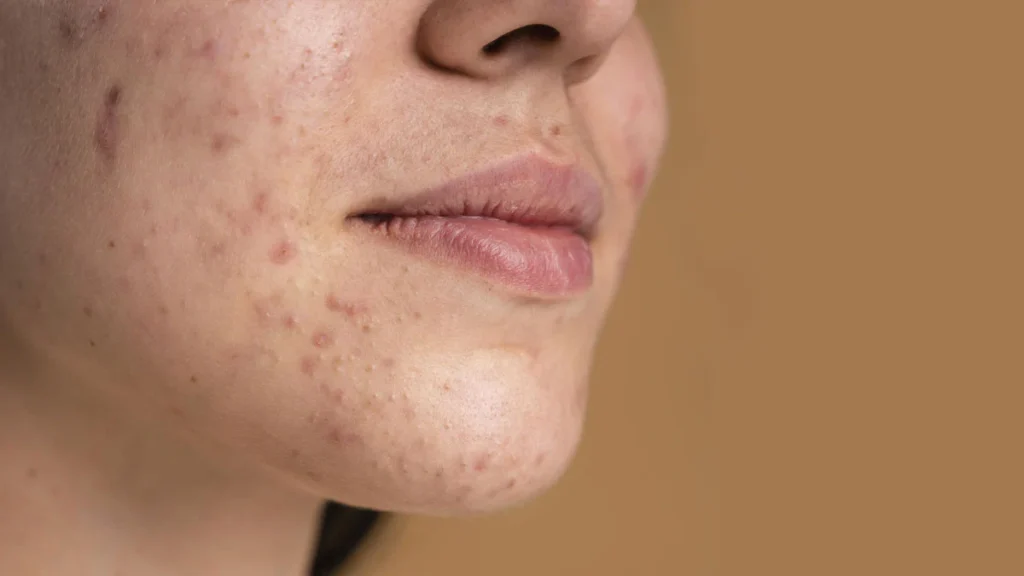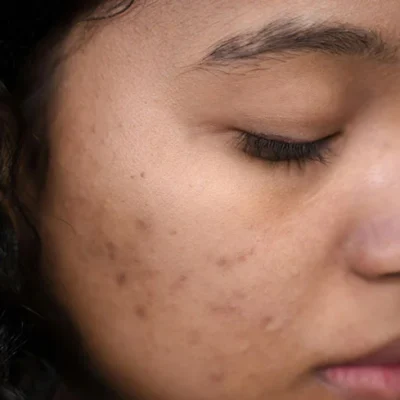
A Comprehensive Guide to Acne Scars: Causes, Symptoms, and Treatment
What’s even more annoying than having pimples? It’s the leftover marks they often leave behind—acne scars. No matter how much we dislike them, the reality is that acne scars are very common for people dealing with pimples.
Many individuals find themselves grappling with the remaining marks that acne leaves behind, affecting both their physical appearance and self-esteem. In this comprehensive guide, we will explore acne scars, their symptoms, causes, and treatments.
Table of Contents
ToggleWhat are Acne Scars?
Acne scars refer to enduring changes in skin texture and indentations resulting from severe acne. It’s important to clarify that the term “scarring” is not applied to the temporary red and brown marks left after acne healing; instead, it refers to lasting marks that require medical attention. These scars form when large, pus-filled spaces, such as acne cysts, damage skin tissue in an irreplaceable manner. Once the cyst empties and the affected area heals, it may leave behind deep facial scarring. In cases of the chest and back, scarring may exhibit a raised, lumpy appearance, known as “hypertrophic” or “keloid” scarring.

Symptoms of Acne Scars
Acne scars can manifest in various forms, and their symptoms can vary depending on the type of scars. Identifying acne scars is crucial for seeking appropriate treatment. Common symptoms include:
- Dark spots or red marks left on the skin after acne has healed.
- Uneven skin texture.
- Persistent redness around the site of healed acne.
- Raised, thickened areas of skin.
- May be itchy or uncomfortable.
- Some people may experience pain or tenderness in the scarred areas.
What causes acne scars?
The scars develop as a result of your body’s attempt to heal acne. The extent and nature of scarring depend on how an individual’s body reacts to the injury. The repair process involves the production of collagen, and an excess of collagen can result in raised scars. Alternatively, the loss of tissue can lead to the formation of pits or indentations in the skin, contributing to other types of scarring.
More factors that contribute to the development of acne scars are:
- Severity of Acne: The more severe the acne, the higher the likelihood of scarring.
- Genetics: Some individuals may be genetically predisposed to scarring.
- Picking and Squeezing: Manipulating acne lesions increases the risk of scarring.
- Delay in Treatment: Failure to treat acne promptly can lead to scarring.
Best Acne Scars Treatment in Mohali
Fortunately, advancements in dermatological science have created the way for effective Acne Scars Treatments. In Mohali, Hale Clinics stands out as one of the best choices in providing cutting-edge solutions for acne scars.
Choosing the Best Treatment to Get Rid of Acne Scars depends on various factors, including the type and severity of scars, skin type, and individual preferences. Hale Clinics specializes in tailoring treatment plans to meet the unique needs of each patient, ensuring the most effective and personalized approach to achieve optimal results.
Conclusion
Don’t let acne scars hold you back, as your skin deserves the best. Acne scars need not be a permanent reminder of past skin troubles. With the right knowledge and advanced Acne Scars Treatments available at Hale Clinics in Mohali, individuals can regain smooth, blemish-free skin and confidence.
FAQs
- What causes acne scars?
Ans. Acne scars are primarily caused by the inflammation and damage to the skin tissue during the healing process of severe acne lesions.
- What are the symptoms of acne scars?
Ans. Symptoms of acne scars include uneven skin texture, indentations or raised areas on the skin, and persistent discoloration.
- Is it possible to prevent acne scars?
Ans. Consistent skincare and early acne treatment can help prevent acne scars.
- What should I discuss with a dermatologist about my acne scars?
Ans. When consulting a dermatologist about acne scars, discuss treatment options, potential risks, expected outcomes, and a personalized skincare plan tailored to your skin type.
